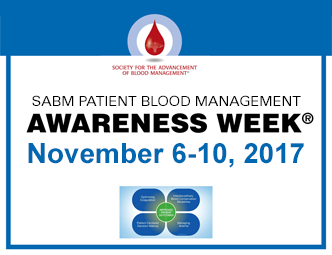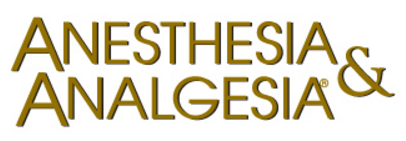SUMMER 2017
ISSUE

The Society for the Advancement of Blood Management (SABM)
invites healthcare organizations worldwide to participate in this week dedicated to educating patients and healthcare professionals about patient blood management.
Download SABM's
Patient Blood Management Awareness Week 2017
Poster and Timeline
Please consider making a donation to your Society. Your donations will help us to improve the lives of people throughout the world through Patient Blood Management.

SABM 2017 Newsletter Publication Schedule
February | May | August | November
Editor
Carolyn Burns, MD
Associate Editor
Tiffany Hall, RN
Contributors
Carolyn Burns, MD
Nabil Hassan, MD
Tiffany Hall, RN
Mary Ann O’Brien RN, MSN, CCRN, CNE
Becky Rock, RN
Kevin Wright
Zac Zahara, MBA and team
Transition Director
Sherri Ozawa, RN
SABM Officers and
Directors
|
|
Standard of the Quarter
Standard # 5 - Transfusion Guidelines and Peer Review of Transfusions
There is effective implementation of comprehensive, written guidelines for transfusion of blood products. These guidelines are evidence based. There is peer review of transfusion decisions based on these guidelines.
Effective implementation of comprehensive transfusion guidelines is a key element in a successful patient blood management program. These guidelines establish a standard of care within the organization for clinical transfusion decisions. Ideally, an institution’s transfusion guidelines are developed and written by a multidisciplinary group of physicians based on a review of the literature including national or specialty specific physician practice guidelines. They must be evaluated by the hospital’s transfusion or quality improvement or quality management committee and approved by the medical staff or medical executive committee or other appropriate authority of the organization’s medical staff to ensure that the guidelines are followed.
(See related Standard # 9 - Minimizing Blood Loss Associated with Surgery, Procedures and Underlying Medical Conditions Including Antithrombotic Therapy, Antiplatelet Therapy and Coagulopathy)
Indicator 5.3 states: The transfusion guidelines take into consideration patient specific factors such as age, diagnosis, laboratory values such as hemoglobin, hematocrit, platelet count, coagulation testing, and presence or absence of critical bleeding and physiologic factors such as oxygenation and hemodynamics.
An important part of a patient blood management program is to evaluate a patient’s risk of transfusion and then take steps to reduce that risk. In many hospitals, much of the focus has been on the reduction of red blood cell usage. As patient blood management programs evolve it is important to implement strategies for risk mitigation of other blood products. This standard of the quarter is aimed at focusing on reducing the use of plasma transfusion.
Many PBM programs utilize CPOE and have evidenced based indications for transfusion imbedded in these orders. Hospitals can evaluate the opportunities for reduction by analyzing internal data for these three areas: indications for FFP, dose prescribed and the measurement of pretransfusion coagulation. A recent evaluation of my own PBM program data illustrated a 60% opportunity in the use of plasma from review of our transfusion guidelines. An additional important finding was that the adult orders for one and two units of plasma were common which suggests under-dosing if necessary for correction of clear coagulopathy. Our evaluation suggests a general lack of understanding among clinicians on the appropriate indication and dosages with significant opportunity to reduce unnecessary plasma transfusion. Physician education and training, development of order sets to assist in the management of patients who need urgent or emergent warfarin reversal with approved evidence-based pharmacological intervention, and implementation of a peer review process could reduce the risk of exposure to plasma transfusion.
Contributor: Tiffany Hall, RN
|
|
PBM for Patient Blood Management Section

Save the Date for SABM's Annual Meeting
September 7 – 9, 2017
Hilton & Executive Tower
Portland, Oregon
PBM Certificate Course
September 6, 2017
7:00am – 6:00pm
Annual Meeting
September 7 – 9, 2017

Consider submitting your future manuscripts in PBM for peer review and publication in this new section. The success of this endeavor will depend on the provision of material to make it lively and attractive to our colleagues and other professionals in the field.
Members Invited to Submit Papers CLICK HERE
Join SABM's Call to Action for Medicare to Expand Coverage for Treatment of Anemia!
Click HERE for detailed information about what you can do to get involved.
© 2017 Society for the Advancement of Blood Management
350 Engle Street
Englewood, NJ 07631
Phone: (928) 551-6400
Fax: (877) 944-2272
EMAIL: [email protected]
|